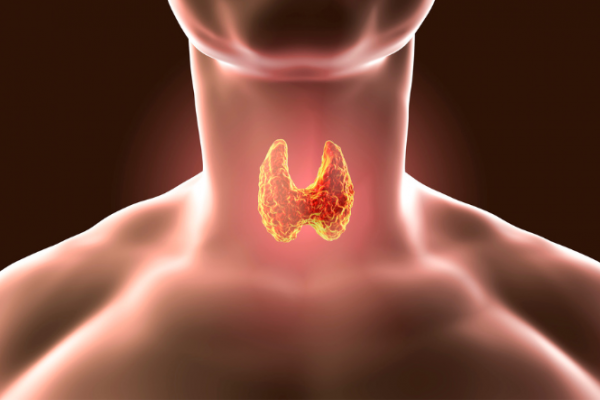Wishing everyone a safe and happy Christmas and New Year – Meri Kirihimete from the Healthify team.
Overactive thyroid
Also known as hyperthyroidism or thyrotoxicosis
Key points about overactive thyroid
- An overactive thyroid (hyperthyroidism) is when your thyroid gland makes too much thyroid hormone.
- It can cause weight loss, anxiety, rapid heartbeat, sleep problems and low energy.
- Common causes include Graves’ disease, thyroid nodules, thyroiditis and some medicines, eg, amiodarone.
- If you have symptoms of an overactive thyroid, see your healthcare provider for a diagnosis.
- Possible treatments include medicines, radioiodine or surgery.
- If an overactive thyroid is not treated, you could develop heart problems, eye problems, osteoporosis or a life-threatening condition called thyroid storm.

An overactive thyroid (hyperthyroidism) is when your thyroid gland makes too much thyroid hormone. It can cause weight loss, anxiety, rapid heartbeat, sleep problems and low energy.
Some of the common causes include Graves’ disease, thyroid nodules, thyroiditis and some medicines, eg, amiodarone.
If you have symptoms of an overactive thyroid, see your healthcare provider for a diagnosis. Possible treatments include medicines, radioiodine or surgery.
If an overactive thyroid is not treated, you could develop heart problems, eye problems, osteoporosis or a life-threatening condition called thyroid storm.
|
See your healthcare provider, go to the nearest emergency department or call 111 for an ambulance if you or someone you care for has thyroid disease and experiences any of the following: |
These symptoms could be a sign of very high thyroid hormone levels (known as thyroid storm, hyperthyroid crisis or thyrotoxic crisis). It is a medical emergency and needs immediate treatment. |
Your thyroid is a small, butterfly-shaped gland in your neck. It produces 2 thyroid hormones: tri-iodothyronine (T3) and thyroxine (T4). Thyroid hormones help your body use energy, stay warm and keep your brain, heart, muscles and other organs working as they should.

Image credit: Canva
An overactive thyroid (hyperthyroidism) is when your thyroid gland makes too much thyroid hormone.
It can cause weight loss, anxiety, rapid heartbeat, sleep problems and low energy.
Thyroid problems can affect anyone, but are more common in women than men.
An overactive thyroid can be caused by a number of conditions:
- Graves’ disease: This is the most common cause. It is an autoimmune disease in which your body’s immune system mistakenly attacks your thyroid gland. Sometimes this condition runs in families.
- Thyroid nodules: These are benign (non-cancerous) lumps that grow on your thyroid. They can produce extra thyroid hormones. Read more about thyroid nodules.
- Too much iodine in your body: This can be caused by taking iodine supplements such as kelp or seaweed.
- Thyroiditis (inflammation of your thyroid gland): This can be caused by a virus or can happen soon after having a baby.
- Some medicines such as lithium or amiodarone can cause an overactive thyroid.
- Thyroid cancer: This is rare, but a thyroid cancer can affect the production of thyroid hormones.
People with an overactive thyroid may have no symptoms at all, or symptoms may start off mild and then gradually get worse.
Symptoms may include:
- losing weight, even though you're eating the same amount or more than usual
- feeling nervous, anxious, moody, weak or tired
- tremor (shaky hands)
- palpitations (fast or ‘thumping’ heartbeat)
- problems breathing
- feeling hot and sweaty
- having looser, more frequent, bowel movements (poo) than usual
- skin problems such as a rash, itching or hair thinning
- trouble sleeping
- a swollen thyroid gland, also known as goitre
- eye pain, double vision, bulging eyes and swollen eyelids – this is more common if you have Graves’ disease
- lighter or no menstrual periods.
The diagnosis of hyperthyroidism may not be obvious at first because symptoms may be mild. See your healthcare provider if you have any of the symptoms noted above. Your healthcare provider will ask you questions, including whether you are taking any medicines or supplements that may affect your thyroid gland. Your healthcare provider will usually do a physical examination and arrange blood tests which may include:
- a thyroid function test – this blood test measures your thyroid hormones (T3, T4) and thyroid stimulating hormone (TSH)
- a test for TSH receptor antibody – if you have Graves’ disease, this antibody level can be high.
If blood tests show you have an overactive thyroid, you will be referred to an endocrinologist (a specialist hormone doctor). Sometimes other tests are needed, such as a scan of your thyroid gland.
Treatment depends on the cause of your overactive thyroid, your age, the severity of your condition, other medical conditions that may be affecting your health and your own preference. Your healthcare provider will discuss the best treatment option with you.
Possible treatment of an overactive thyroid
- Medicines such as carbimazole to reduce the amount of thyroid hormones produced by your thyroid gland. Read more about carbimazole.
- Radioactive iodine therapy which works by destroying overactive thyroid cells. You have it in a drink of water or as a capsule to swallow. You may need more than 1 dose. Read more about radioactive iodine therapy.
- Surgery (thyroidectomy) to remove all or part of your thyroid. It will only be considered if other therapies and medicines haven't worked, or if you're at a higher risk of getting side effects from other treatments. Surgery is a good option if you have a large tumour (called a goitre) causing problems in your neck.
If hyperthyroidism goes untreated for a long time, it may lead to severe complications, which can be avoided with treatment.
These include:
- heart problems such as atrial fibrillation or heart failure
- eye problems
- osteoporosis (brittle bones)
- a thyroid storm (fever, delirium, rapid pulse or loss of consciousness) – this is an medical emergency that needs immediate treatment.
The NZ Thyroid Support Group provides support for people to meet, talk and share information about thyroid disorders. Visit their website(external link) or contact them by phone: 09 480 2680.
The following links provide further information about overactive thyroid. Be aware that websites from other countries may have information that differs from New Zealand recommendations.
Hyperthyroidism(external link) DermNet NZ
Thyroid – hyperthyroidism(external link) Better Health Channel, Australia
Hyperthyroidism, Graves’ disease and thyroid eye disease(external link) The Australian Thyroid Foundation, Australia
Overactive thyroid gland(external link) Patient Info, UK
Overactive thyroid(external link) NHS, UK
References
- Hyperthyroidism(external link) 3D Regional HealthPathways, NZ, 2021
- Campbell K, Doogue M. Evaluating and managing patients with thyrotoxicosis(external link) Aust Fam Phys. 2012;41(8):564–572
- Management of thyroid dysfunction in adults(external link) BPAC, NZ, 2010
- Hyperthyroidism(external link) Patient Info, UK
- Treating an overactive thyroid (hyperthyroidism)(external link) Health New Zealand | Te Whatu Ora, NZ
- Carbimazole(external link) NZ Formulary
Clinical guidelines and resources
Carbimazole(external link) NZ Formulary
Hyperthyroidism(external link) Patient Info, UK
Management of thyroid dysfunction in adults(external link) BPAC, NZ, 2010
Campbell K, Doogue M. Evaluating and managing patients with thyrotoxicosis(external link) Aust Fam Phys. 2012;41(8):564–572
Continuing professional development
New diagnosis of hyperthyroidism in primary care(external link) BMJ Learning, UK
Credits: Healthify editorial team. Healthify is brought to you by Health Navigator Charitable Trust.
Reviewed by: Dr Alice Miller, GP, FRNZCGP, Wellington
Last reviewed:
Page last updated:





